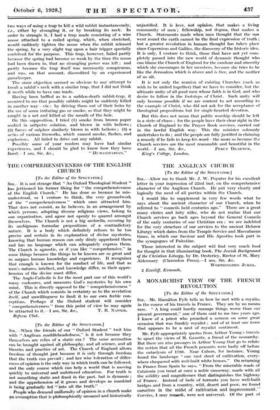THE COMPREHENSIVENESS OF THE ENGLISH CHURCH
[To the Editor of the SPECTATOR.] Stn,—It is not strange that " An Oxford Theological Student " has jettisoned his former liking for "the comprehensiveness of the English Church." He has done so because he mis- understood, so I venture to think, the very groundwork of the " comprehensiveness " which once attracted him. That. does not consist, as he believes, in an arrangement by which .persons, adopting diverse religious views, belong to one organization, and agree not openly to quarrel amongst themselves. The Church is not a big umbrella, covering by its ambiguous formulae propositions of a contradictory nature. It is a body which definitely refuses to be too precise and certain in its explanation of divine mysteries, knowing that human reason can only dimly apprehend them and has no language which can adequately express them. The Church is agnostic, or if you like "comprehensive," in some -things because the things to be known are so great and so. surpass hunian knowledge and experience. It recognizes that enough is known for the conduct of life, and that as men's natures; intellect, and knowledge differ, so their appre- hension of the divine must differ.
The Anglo-Catholic is for the most part one of this world's many cocksures, and measures God's mysteries by his own mind. This is directly opposed to the " comprehensiveness " of the Church which consists in certainty as to the revelation itself, and 'unwillingness to limit it to our own feeble con- ceptions. Perhaps if the Oxford student will consider
comprehensiveness " from this point of view he may again be attracted to am, Sir, &c., T. B. NAPIER. Reform CM'.






















































 Previous page
Previous page